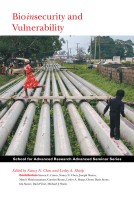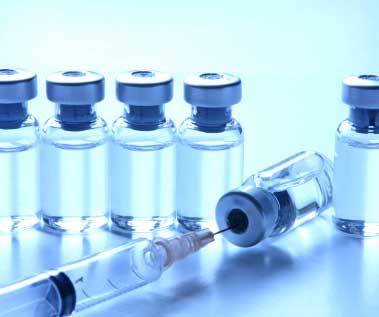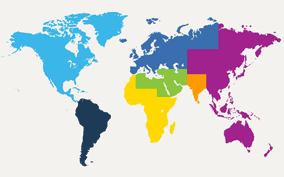-
Op-Ed – Dual-Use Research: Is it possible to protect the public without encroaching rights?

T. Tosin Fadeyi, Master’s Candidate, Biotechnology (Biodefense and Biosecurity Concentration), University of Maryland University College For decades, scientists have had reasonable freedom and control over their research and experiments and able to publish and share their work without much inconvenience. The freedom of creativity in the field of science is much like that of an artist – often fueled by an inspiration from other sources, a passion for a unique realm of art (in this case, science), and a natural curiosity. Within reasonable limits, artists and scientists had the world at their fingertips; as long as they weren’t causing a societal disruption Read More »
- May 18, 2015 |
- Filed Under Biosafety, Biotechnology, International, Policy & Initiatives, Research
-
Book Review: Bioinsecurity and Vulnerability

Reviewed by T. Tosin Fadeyi Edited by Nancy N. Chen and Lesley A. Sharp Contributors: Steven C. Caton, Nancy N. Chen, Joseph Masco, Monir Moniruzzaman, Carolyn Rouse, Lesley A. Sharp, Glenn Davis Stone, Ida Susser, David Vine, and Michael J. Watts. Bioinsecurity and Vulnerability is an intuitive compilation of writings that explore the hysteria surrounding preparation for a silent threat: biological terror. The essays in this book illustrate the reality of biological preparedness in the 21st century by bringing together previously unacquainted realms like genetic engineering, the military, and accidental disasters around the world. Bioinsecurity features relevant photography to illustrate and enhance the contributors’ discussions. Rather Read More »
- April 30, 2015 |
- Filed Under Biosafety, Bioterrorism, International, Policy & Initiatives
-
Op-Ed – Microbial Forensic Attribution: Where Science Meets International Relations

Christopher A. Bidwell, JD, Senior Fellow for Nonproliferation Law and Policy, Federation of American Scientists & Mark Jansson, Program Manager, CRDF Global. The U.S. government is making significant investments in bio forensics as a tool for attribution. In order for that investment to pay-off, it must be combined with investments in international collaborations so that the science behind any future attribution claims that may be made are accepted as fact, both in scientific and political terms. To better understand how evidence derived from microbial forensics will be received in international contexts among people with different cultural, professional, and political backgrounds, the Federation of American Read More »
- July 17, 2014 |
- Filed Under Agents & Toxins, Biocrimes, Biological Weapons, Biosafety, Bioterrorism, Countermeasures, International, Policy & Initiatives, Public Health
-
Op-Ed – Science Needs for Microbial Forensics: Developing Initial International Research Priorities

Committee on Science Needs Microbial Forensics: Developing an Initial International Roadmap, Board on Life Sciences, Division of Earth and Life Sciences, National Research Council of the National Academies. Today we find ourselves with a complex infrastructure of government agencies, Select Agent registries, regulated research, environmental monitoring in designated cities, federal and state regulations—all resulting from one more or less successful biological attack on the United States. The Amerithrax attack with highly refined material produced by a knowledgeable expert (presumably in a U.S. bioweapons laboratory) resulted in 22 illnesses and 5 deaths. Approximately 4 g of material were used in the Amerithrax attack. Read More »
- July 17, 2014 |
- Filed Under Agents & Toxins, Agriculture, Biocrimes, Biological Weapons, Biosafety, Biotechnology, Bioterrorism, Countermeasures, International, Policy & Initiatives, Public Health, Research
-
Vaccinations have prevented at least 103 million cases of contagious disease since 1924

(TheVerge) Vaccinations have been credited with some of humanity’s greatest health technological triumphs over disease, including drastically reducing polio around the globe and almost eliminating smallpox entirely. But how many people have been spared life-threatening infections thanks to the introduction of vaccines? At least 103.1 million children in the US alone since 1924, according to a new analysis of historical infection rate data going back to 1888.
- December 2, 2013 |
- Filed Under Policy & Initiatives, Public Health
Browse by region

Browse By Category
US Army Contracts for Infectious Disease Research in Thailand
(Global Biodefense) The US Army Medical Research Acquisition Activity (USAMRAA) has announced its intent to award two contracts under a sole-source basis to support research activities in Thailand. The first contract is for collaborative influenza surveillance studies with Phramongkutkloa Hospital in Bangok under Solicitation Number: W81XWH12T0227.
- May 1, 2012
- | Filed under Asia/Pacific, North America, International, Policy & Initiatives, Public Health, and Research
Federal government reviewing projects for high-risk dual use bioresearch
(Fierce Homeland Security) The federal government is undertaking a comprehensive risk assessment of its funded biological research that involves experimentation with agents that have the potential to cause mass casualties, officials told a April 26 Senate panel. The review is the result of an updated policy (.pdf) on “dual use research Read More »
- May 1, 2012
- | Filed under Europe, North America, Policy & Initiatives, and Research
Malaysia Advancing Work on Anti-Bioweapons Bill
(Global Security Newswire) Malaysian legislation to prohibit development and stockpiling of biological weapons within the nation has been drafted and is to be presented for government feedback next week, the Sun Daily newspaper reported. The domestic legislation is to be examined in a Defense Ministry hearing on Tuesday. “We will be going Read More »
- May 1, 2012
- | Filed under Asia/Pacific, Biological Weapons, and Policy & Initiatives
Swedish Military Cited as Unable to Defend Against WMD Strikes
(Global Security Newswire) The Swedish military lacks the ability to protect the country's populace from chemical, biological or radiological attacks, among other threats, The Local on Monday cited issue specialists as saying. “The Swedish armed forces could not be deployed if the situation would require it,” ex-Swedish Defense Research Agency analyst Johan Read More »
- May 1, 2012
- | Filed under Europe, Biological Weapons, and Policy & Initiatives
Illnesses Prompt Fears of Anthrax Strike at British Army Facility
(Global Security Newswire) Several personnel at the British army’s primary intelligence site showed significant symptoms of illness on March 30, raising later-disproven suspicions that an anthrax attack had occurred and bringing attention to the site’s vulnerability to a biological or chemical strike, the London Daily Star reported on Sunday. The incident Read More »
- May 1, 2012
- | Filed under Europe, Biological Weapons, and Bioterrorism
Countermeasures More »
-
BAA – Medical Countermeasures for Priority Pathogens
(Global Biodefense) The National Institute of Allergy and Infectious Diseases (NIAID) has released Read More »
-
New Antibody Weapons Against Marburg Virus
(Global Biodefense) A new study led by scientists at The Scripps Research Institute identifies Read More »
-
FDA Accepts BLA for Inhalational Anthrax Countermeasure
(Global Biodefense) Anthim (obiltoxaximab) is for the treatment and prevention of inhalational anthrax, Read More »
-
South Korea MERS death toll rises to 20
(CNN) The World Health Organization said Tuesday that the number of new cases Read More »
-
What you should know about MERS, the mystery disease that has South Korea on edge
(Washington Post) The spread of MERS, which has infected 126 people since the outbreak began last Read More »
Research More »
-
We Now Know More About Sexually Transmitted Ebola
(TIME) In March 2015, officials discovered that a Liberian man who had survived Read More »
-
Scientists find new variant of streptococcal bacteria causing severe infections
(Imperial College London) Scientists have discovered a new variant of streptococcal bacteria that Read More »
-
VUMC joins Human Vaccine Project as first scientific hub
Vanderbilt University Medical Center (VUMC), the Human Vaccines Project and the International AIDS Read More »
-
Researcher who spiked rabbit blood to fake HIV vaccine results slapped with rare prison sentence
(Washington Post) Dong Pyou Han, a former Iowa State University researcher charged with Read More »
-
New Antibody Weapons Against Marburg Virus
(Global Biodefense) A new study led by scientists at The Scripps Research Institute identifies Read More »
Public Health More »
-
How Yelp Can Be Used to Track Outbreaks of Food Poisoning
When a Shigella outbreak at a San Jose, California, seafood restaurant sickened dozens Read More »
-
We Now Know More About Sexually Transmitted Ebola
(TIME) In March 2015, officials discovered that a Liberian man who had survived Read More »
-
Legionnaires’ Bacteria Regrew in Bronx Cooling Towers That Were Disinfected
(TheNewYorkTimes)- The 15 water-cooling towers that were found to be contaminated this week Read More »
-
Millions More Need H.I.V. Treatment, W.H.O. Says
(TheNewYorkTimes)- The World Health Organization issued sweeping new guidelines on Wednesday that could put Read More »
-
Sentencing scheduled for peanut executive in salmonella case
(Washington Post)- ALBANY, Ga. — A former peanut executive convicted of shipping tainted Read More »
































